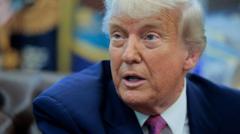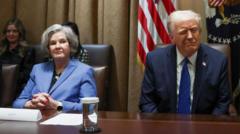Trump's escalating rhetoric comes amidst intensified military attacks by Russia on Ukraine, signaling a complicated geopolitical landscape.
Trump Sets Two-Week Ultimatum for Putin on Ukraine Conflict

Trump Sets Two-Week Ultimatum for Putin on Ukraine Conflict
In a recent statement, President Trump warned that he would reassess U.S. strategy regarding Russia based on Putin's actions in the coming weeks.
In a dramatic turn of events, US President Donald Trump has publicly issued a two-week ultimatum to Russian President Vladimir Putin, suggesting that he will gauge Russia's true intentions regarding the ongoing war in Ukraine based on their actions in the coming days. During a press conference in the Oval Office, Trump reflected on whether he believed Putin was genuinely intent on ending the conflict, stating, “I can’t tell you that, but I’ll let you know in about two weeks.”
This warning comes as the Kremlin has ramped up its military offensives, marking some of the most aggressive attacks observed since the war's inception four years ago. Over the weekend, key strikes in Kyiv resulted in at least 13 fatalities and numerous injuries, with ongoing assaults indicating no decline in hostilities.
As Trump critiques Putin's maneuvers, he referenced his social media posts where he accused the Russian leader of insanity, stating he was “playing with fire.” The White House appears to be losing patience as diplomatic discussions yield minimal progress, exemplified by Trump’s recent phone call with Putin, which had been deemed a success but failed to lead to any concrete agreements.
Despite Trump's stern warnings, his prior threats have largely gone unheeded by the Kremlin. Since entering office, Trump has predominantly imposed restrictions on Ukraine under US directive, while refraining from demanding substantial concessions from Russia. Though the Biden administration asserts that sanctions against Russia remain in effect, critics argue that their mediative approach seems to empower Moscow further.
A notable shift came after intensified attacks, leading Trump to express an ambiguous belief that "something has happened" to Putin. This notion was dismissively addressed by Russian officials, citing a lack of awareness on Trump's part regarding the broader situation, which has included allegations of Ukraine attacking Russian cities.
In response to the heightened tensions, Germany’s Chancellor Friedrich Merz pledged support to Ukraine, including assistance in producing long-range missiles, which may further complicate the fragile peace process. The Kremlin regards this as a potential escalation, indicating it could jeopardize ongoing negotiations.
As Ukraine continues to suffer immense losses and significant territorial damage due to the conflict, the war’s toll remains staggering, with tens of thousands dead and much of the eastern region held under Russian control. Ukrainian President Volodymyr Zelensky has voiced frustrations over Moscow’s reluctance to deliver proposed peace terms, with indications that negotiations may veer into lengthy and intricate discussions moving forward.
This warning comes as the Kremlin has ramped up its military offensives, marking some of the most aggressive attacks observed since the war's inception four years ago. Over the weekend, key strikes in Kyiv resulted in at least 13 fatalities and numerous injuries, with ongoing assaults indicating no decline in hostilities.
As Trump critiques Putin's maneuvers, he referenced his social media posts where he accused the Russian leader of insanity, stating he was “playing with fire.” The White House appears to be losing patience as diplomatic discussions yield minimal progress, exemplified by Trump’s recent phone call with Putin, which had been deemed a success but failed to lead to any concrete agreements.
Despite Trump's stern warnings, his prior threats have largely gone unheeded by the Kremlin. Since entering office, Trump has predominantly imposed restrictions on Ukraine under US directive, while refraining from demanding substantial concessions from Russia. Though the Biden administration asserts that sanctions against Russia remain in effect, critics argue that their mediative approach seems to empower Moscow further.
A notable shift came after intensified attacks, leading Trump to express an ambiguous belief that "something has happened" to Putin. This notion was dismissively addressed by Russian officials, citing a lack of awareness on Trump's part regarding the broader situation, which has included allegations of Ukraine attacking Russian cities.
In response to the heightened tensions, Germany’s Chancellor Friedrich Merz pledged support to Ukraine, including assistance in producing long-range missiles, which may further complicate the fragile peace process. The Kremlin regards this as a potential escalation, indicating it could jeopardize ongoing negotiations.
As Ukraine continues to suffer immense losses and significant territorial damage due to the conflict, the war’s toll remains staggering, with tens of thousands dead and much of the eastern region held under Russian control. Ukrainian President Volodymyr Zelensky has voiced frustrations over Moscow’s reluctance to deliver proposed peace terms, with indications that negotiations may veer into lengthy and intricate discussions moving forward.




















